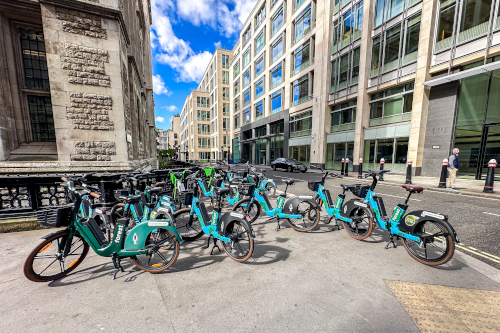Leading disabled rights campaigner Lord Holmes has raised concerns over the Government's plan to devolve micromobility regulation powers, calling the schemes a 'clear and present danger' to vulnerable road users.
The recent government white paper on devolution pledged new powers for local transport authorities 'to regulate on-street micromobility schemes (like hire bikes)'.
In the paper, the Government was careful to frame the powers as helping 'local areas shape these schemes around their needs, connect people to public transport, and tackle the scourge of badly parked cycles and e-cycles'.
However, Lord Holmes has questioned how widespread devolution fits with the accessibility needs of vulnerable pavement users, given the potential for these schemes to be used on footways and to litter them.
'How can on-street micromobility schemes such as e-bike rentals be part of a public realm of transport which is inclusive by design? How can they fit within anything which could be seen as safe? Reports have described the fire risks and trip hazards when they are abandoned on pavements,' he said to Highways.
The Paralympian gold medalist, who has previously campaigned against shared space schemes, added: 'How do these micromobility schemes help with people’s health? How can they help other pedestrians, who—as is suggested by the word “pedestrian”—are trying to walk on the pavement? For me, that is an impossibility and a clear and present danger, but they would be a trip hazard for anybody.
'I welcome the recognition that regulation is required but am concerned at what form this will take. If something is not safe, if it is not inclusive design, what part can it possibly have in a society for everybody?'
Those representing the shared transport industry welcomed the move. Collaborative Mobility UK (CoMoUK), the national charity for the public benefits of shared transport, argued their greater use would reduce greenhouse gas emissions and reduce congestion.
Richard Dilks, chief executive of CoMoUK, said: 'As the white paper identifies, it is important to get the balance right so these positive impacts of shared transport are maximised and issues such as poor parking are minimised.'
Meanwhile, there was positive news on accessibility issues from the white paper, with the promise of action on pavement parking, a long-standing issue for vulnerable footway users.
The white paper said the government would 'publish a formal response to the 2020 pavement parking consultation'.
Ministers said they 'expect Strategic Authorities to play a leading role in developing a consistent approach to enforcement across their area, using available powers as appropriate'.






